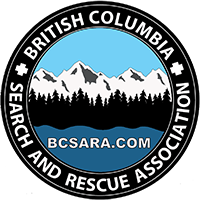Sidney, B.C. – The BC Search and Rescue Association (BCSARA) is pleased to share that search and rescue (SAR) callouts have dropped from 2,100 requests for help in 2021 to 1,500 calls in 2022 – showing a definite return to pre-pandemic levels.
Due to its mountainous terrain and unique coastal weather conditions, British Columbia has always received the most search and rescue calls in all of Canada. However, during the height of the pandemic, a surge in even higher call volume challenged our 78 volunteer SAR groups across the province. Despite this, a search and rescue call has never gone unanswered in B.C. in our 20-year history as an organization.
Although the SAR calls in 2022 were down from our record high in 2021, that statistic represents only half of the story as SAR calls are still increasing. Looking to the future, our data forecast shows B.C.’s annual SAR call volume reaching pandemic levels again by 2026 and doubling to 3,000 incidents per year by 2046. By being accountable for pre-adventure planning and personal preparedness, recreationalists can help slow this concerning trend.
The public, including hikers, backcountry skiers, snowshoers, mountain bikers, climbers and snowmobilers, can support B.C.’s search and rescue groups by taking preparedness seriously and we thank those who have already done so. Enthusiasts play an important role in keeping the SAR call volume at a manageable level, which benefits everyone involved including our 3,400 search and rescue volunteers.
For almost two decades, BCSARA, through its BC AdventureSmart program, has been proactively offering reliable outdoor education, based on data, to the experienced and the unaware, the young and the mature. In addition to reducing the number of calls, a well-prepared recreationalist can also help to reduce the severity of a call which is equally important to the responding SAR group.
Small actions such as leaving a trip plan with family/friends, carrying essential safety gear for emergencies, using a reliable primary means of communication (satellite phone, devices like InReach, Zoleo and Spot), a secondary means of communication (cellphone) and having first aid training can combine to produce a significant positive outcome that saves time, reduces risk and lessens suffering.
For more information about wise outdoor practices, please visit https://bcsara.com/outdoor-education/
Media Only Contact Information
BC Search and Rescue Association
Nancy Argyle, Manager of Public Relations and Communications
250-204-0163 / media@bcsara.com
About BCSARA
Ground Search and Rescue (GSAR) in British Columbia is provided solely by volunteers. On call 24 hours a day, 365 days a year, these unpaid professionals provide their time, dedication and expertise as well as their own personal gear at no cost to the people of B.C. and to the individuals they rescue. BC SAR teams have never not responded to an activation in the 20-year history of the BCSARA organization. BCSARA is proud to represent the 3,400+ GSAR volunteers in B.C. who make up 78 teams across the province. To donate to support these volunteers, please visit here.
Follow us on Twitter (@BCSARAssoc)
Follow us on Facebook (@BCSARAssoc)
Follow us on Instagram (@bcsarassoc)
Follow us on YouTube (@BCSARAssoc)
Follow us on Twitter (@BCAdvSmart)
Follow us on Facebook (@BCAdvSmart)
Follow us on Instagram (@bcadvsmart)
Follow us on LinkedIn (@bc-adventuresmart)
How to request SAR help
All requests must go through 911 or, if using a satellite phone, through the Emergency Coordination Centre at 1-800-663-3456. Do NOT wait 24 hours to report someone overdue or missing. SAR teams can only be activated by a requesting agency such as the police or EHS.
How much does SAR help cost
There is no charge for search and rescue in British Columbia.
